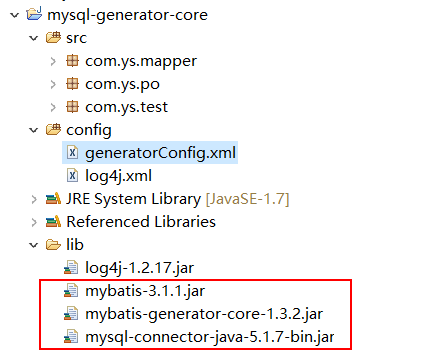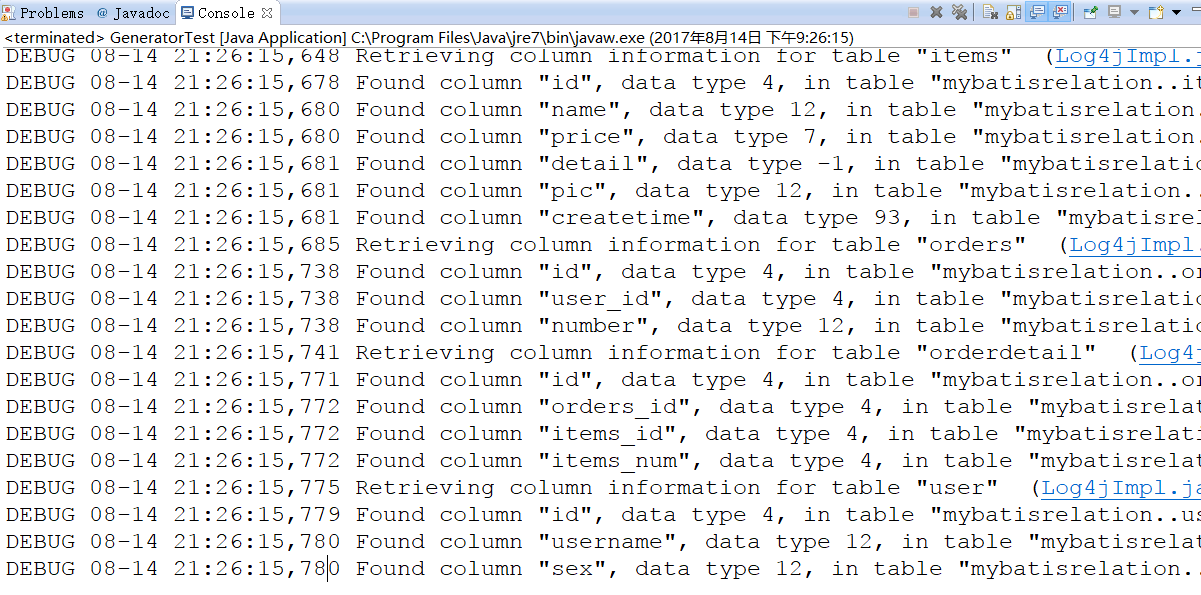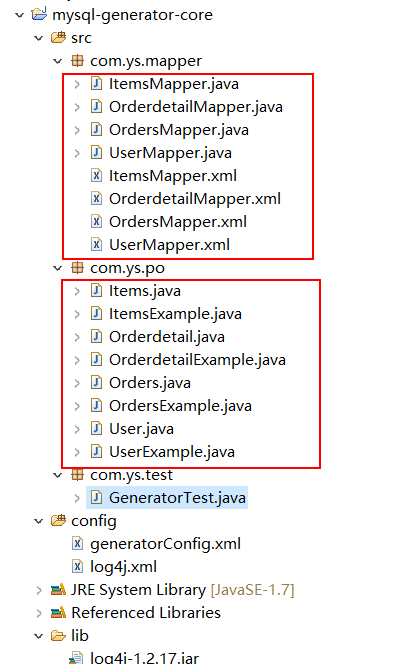十、逆向工程
通过前面的学习,在实际开发中,我们基本上能对mybatis应用自如了,但是我们发现了一个问题,所有操作都是围绕着po类,xxxMapper.xml文件,xxxMapper接口等文件来进行的。如果实际开发中数据库的表特别多,那么我们需要手动去写每一张表的po类,xxxMapper.xml,xxxMapper.java文件,这显然需要花费巨大的精力,而且可能由于表字段太多,写错了而不知道也是可能的。
所以我们在实际开发中,一般使用逆向工程方式来自动生成所需的文件。
本篇博客源码下载链接:http://pan.baidu.com/s/1nvvA68L 密码:jc1p
①、新建一个工程,并导入相应的jar包(详情见上面源码)

注意:使用逆向工程时,最好新建一个工程,如果你在原来的工程中使用,那也可以,但是有一定的风险,因为mybatis是根据配置文件中配置的路径来生成的文件的,如果你工程中有相同名字的文件,那么就会被新生成的文件所覆盖。所以实际开发中,我们一般新建一个工程,将生成的文件复制到自己的所需的工程中。
②、创建配置文件 generatorConfig.xml 文件
|
1
2
3
4
5
6
7
8
9
10
11
12
13
14
15
16
17
18
19
20
21
22
23
24
25
26
27
28
29
30
31
32
33
34
35
36
37
38
39
40
41
42
43
44
45
46
47
48
49
50
51
52
53
|
<?xml version="1.0" encoding="UTF-8"?><!DOCTYPE generatorConfiguration PUBLIC "-//mybatis.org//DTD MyBatis Generator Configuration 1.0//EN" "http://mybatis.org/dtd/mybatis-generator-config_1_0.dtd"><generatorConfiguration> <context id="testTables" targetRuntime="MyBatis3"> <commentGenerator> <!-- 是否去除自动生成的注释 true:是 : false:否 --> <property name="suppressAllComments" value="true" /> </commentGenerator> <!--数据库连接的信息:驱动类、连接地址、用户名、密码 --> <jdbcConnection driverClass="com.mysql.jdbc.Driver" connectionURL="jdbc:mysql://localhost:3306/mybatisrelation" userId="root" password="root"> </jdbcConnection> <!-- <jdbcConnection driverClass="oracle.jdbc.OracleDriver" connectionURL="jdbc:oracle:thin:@127.0.0.1:1521:yycg" userId="yycg" password="yycg"> </jdbcConnection> --> <!-- 默认false,把JDBC DECIMAL 和 NUMERIC 类型解析为 Integer,为 true时把JDBC DECIMAL和NUMERIC类型解析为java.math.BigDecimal --> <javaTypeResolver> <property name="forceBigDecimals" value="false" /> </javaTypeResolver> <!-- targetProject:生成PO类的位置,重要!! --> <javaModelGenerator targetPackage="com.ys.po" targetProject=".\src"> <!-- enableSubPackages:是否让schema作为包的后缀 --> <property name="enableSubPackages" value="false" /> <!-- 从数据库返回的值被清理前后的空格 --> <property name="trimStrings" value="true" /> </javaModelGenerator> <!-- targetProject:mapper映射文件生成的位置,重要!! --> <sqlMapGenerator targetPackage="com.ys.mapper" targetProject=".\src"> <property name="enableSubPackages" value="false" /> </sqlMapGenerator> <!-- targetPackage:mapper接口生成的位置,重要!! --> <javaClientGenerator type="XMLMAPPER" targetPackage="com.ys.mapper" targetProject=".\src"> <property name="enableSubPackages" value="false" /> </javaClientGenerator> <!-- 指定数据库表,要生成哪些表,就写哪些表,要和数据库中对应,不能写错! --> <table tableName="items"></table> <table tableName="orders"></table> <table tableName="orderdetail"></table> <table tableName="user"></table> </context></generatorConfiguration> |
注意:
1、连接数据库的配置,包括数据名称,数据库用户名密码等配置
2、指定要生成代码的包名,包括实体类po的包名,mapper的包名等
3、指定数据库中哪些表需要生成文件
③、运行主程序生成代码
|
1
2
3
4
5
6
7
8
9
10
11
12
13
14
15
16
17
18
19
20
21
22
23
24
25
26
27
28
29
30
31
32
33
34
35
36
37
|
package com.ys.test;import java.io.File;import java.util.ArrayList;import java.util.List;import org.mybatis.generator.api.MyBatisGenerator;import org.mybatis.generator.config.Configuration;import org.mybatis.generator.config.xml.ConfigurationParser;import org.mybatis.generator.internal.DefaultShellCallback;public class GeneratorTest { public void testGenerator() throws Exception{ List<String> warnings = new ArrayList<String>(); boolean overwrite = true; //指向逆向工程配置文件 File configFile = new File(GeneratorTest.class.getResource("/generatorConfig.xml").getFile()); ConfigurationParser cp = new ConfigurationParser(warnings); Configuration config = cp.parseConfiguration(configFile); DefaultShellCallback callback = new DefaultShellCallback(overwrite); MyBatisGenerator myBatisGenerator = new MyBatisGenerator(config, callback, warnings); myBatisGenerator.generate(null); } public static void main(String[] args) throws Exception { try { GeneratorTest generator = new GeneratorTest(); generator.testGenerator(); } catch (Exception e) { e.printStackTrace(); } }} |
直接运行上面的程序,控制台会打印如下代码,说明生成代码成功

然后刷新generatorConfig.xml 文件中指定的包,会发现生成了如下文件





